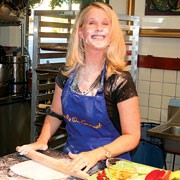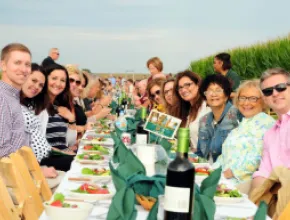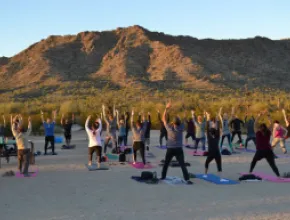“Oh no, I’ve got to cook!”
“Oh boy, I get to cook!”
“I have no clue how to cook but will go along with the crowd.”
These three reactions are typical of corporate groups who are surprised to learn their next meal is dependent on their cooking skills.
“When people realize they will be divided into groups to prepare one segment of a meal, their reactions vary widely,” says Jim Connolly, president of CEO Chef, a Los Angeles-based culinary team-building company.
While some are enthusiastic, Connolly notes that others are filled with dread as they stare at the cutting boards, paring knives and frying pans before them. Wine and cheese before the event help calm down nerves, but few understand beforehand how chopping, dicing, and sauteing translate into communication and bonding skills that can be transferred to the office.
In recent years, culinary events have joined ropes courses and golf outings as popular team-building events. Some of these events are designed to simply create a bond between employees who have never worked together before. When eggs curdle unexpectedly or a mousse turns to pudding, office stereotypes break down quickly as the team rallies to save the dish.
Other culinary events are more competitive, with the clock ticking away. The hotshot sales executive learns to listen to a recent hire, who turns out to be a whiz in the kitchen, knowing he or she can save the team from total embarrassment.
With celebrity chefs opening restaurants, cookbooks on best-seller lists and the Food Network enticing viewers to follow along at home, it’s no wonder that culinary team building is a growing industry.
Most fall into one of the following categories:
Mobile Service
When companies want a business-oriented learning experience to accompany a culinary event, they can turn to facilitators who travel to the meeting site.
Richard Cooper, director of culinary events for Recipe for Success, based in Connecticut, has organized programs at hotels and conference centers throughout the U.S. and Canada for companies such as American Express, Deloitte & Touche, and Trammell Crow Residential.
“The Team Cuisine is our most popular event,” Cooper says. “The event is a surprise to the participants as they enter a ballroom set up with cooking equipment at each table. Each group selects their own chef de cuisine and I observe how this leader operates and how often other people step into the leadership position.
“All groups are given sealed envelopes with the name of the dish they are responsible to make. There are no recipes. We encourage them to beg, borrow or steal ingredients from other tables that will enhance their dish. People get very possessive of their ingredients.”
Cooper and his facilitators judge the platters of food on presentation, taste, cleanliness, teamwork, and leadership. The debriefing then begins.
“I ask the participants what they have learned that they can take back to the workplace,” he says. “Dialogue gets going. I also tell them my observations. ‘If you can prepare a dish without a recipe, without a kitchen and with colleagues with whom you may never have worked, what else can you accomplish?’ They usually answer, ‘Anything.’”
Cooper and his team of facilitators have worked with up to 300 people.
“I actually prefer not to use a kitchen in order to show that elaborate kitchen equipment is not the secret to success,” he says. “Rather, it’s the cooks. The food turns out delicious because the people make a huge effort to make it great.
“As in the world of business, there is no recipe for success,” he continues. “If you are told to increase your customer base by 10 percent, there is no recipe for doing so. So, we give the teams a basket of ingredients and tell them what the outcome should be.”
Cooper says it’s usually the men who focus on making each dish look good. The company logo may be carved out of squash. They come up with team sounds and team names such as “Food Fighters.”
“It’s fun to watch the transformation of people as they get more involved in team building,” he says. “Our aim is to teach teamwork, not cooking skills. Good teamwork is really good communication skills. While hunger may be the motivation, the event always turns out to be fun.”
Jim Connolly’s CEO Chef is another culinary team-building company that will bring its services to the meeting location. Its clients have included Amgen, Sun Microsystems, Eli Lilly, NBC Universal, and Disney.
CEO Chef’s Corporate Culinary Challenge is four hours long and divided into three parts—cooking, eating and getting to know one another, plus a follow-up discussion.
“Usually, event planners ask for a specific topic to be addressed,” Connolly says. “It could be team communications, leadership, cooperation and collaboration, innovation, or diversity training. Getting to know one another during a cocktail hour doesn’t work because people gravitate to those they already know. Here they are forced to meet and dine with other people.”
Local Gourmet Companies
Catering companies are branching out into the corporate arena as more requests come in for culinary team-building events.
Hands on Gourmet, for example, is a three-year-old company in San Francisco that caters to corporate groups and private parties. Headed by Executive Chef Stephen Gibbs, the mobile company sets up its team-building programs at various venues, including wineries, culinary show kitchens, and company conference rooms.
Depending on the number of participants, Gibbs works with five to eight chefs who set up a complete kitchen in the designated location, then teach and help the employees prepare the meal. Normally, the corporate group prepares two appetizers, a first course, a main course, and a dessert for a sit down dinner.
“At first people who don’t know how to boil water are intimidated by the process,” Gibbs says. “They stand back and watch, not helping at all. But as they see their co-workers having fun, they step up, too.
“Because there are no titles, roles or hierarchy in the group, everyone is horizontally on the same plain. The CEO is no longer in charge. A group of engineers who could not work together found the ability to do so while making gnocchi.”
The chefs wander from workstation to workstation to make sure the teams don’t make major culinary mistakes. Gibbs says he learned the hard way that souffles and egg-based sauces are too difficult for teams to make.
The entire event, including eating, takes three hours. There are no post-meal evaluations or discussion.
Cooking Schools
Cooking schools are also opening their doors to corporate groups.
In business since 1989, Cooking by the Book in New York City has expanded its culinary programs to include a Team Builder event held in its 12-person loft.
The corporate client chooses whether to have a three-hour collaborative cooking experience or a four-hour Iron Chef-style competition. In both cases, the cooking school chefs work with the corporate facilitator to create hands-on cooking activities, followed by a debriefing. Clients include Viacom, MTV, Nickelodeon, and FCC National Bank.
Conference Centers
Hotels that attract corporate clients are another good source to check.
Chaminade in Santa Cruz, Calif., is a hotel and conference center with 80 percent of its guests arriving as part of a group business package. Although Chaminade offers a variety of team-building events, including photo scavenger hunts and rock climbing walls, its Chili Cookoff held during the summer months has grown in popularity since it started four years ago. Hoffmann-La Roche, Intuit and Google are among the corporate clients that have participated in the program.
“We can handle up to 120 people whose goal is to create a prize-winning chili dish,” says Sherrie Huneke, director of sales at the property. “Groups of five to eight people are given a basic recipe plus a choice of 50 ingredients that include peppers, onions, chicken, beans, dried chilies, even tequila. The team is allotted 45 minutes to cook a tasty chili on a portable burner, then come up with a name and a chant. Our chefs judge the chili for its taste plus its name, and the chant for creativity.”
Men, in particular, enjoy the chili event, she adds.
“Before long, they start fooling around and place the latex gloves on their heads while taking a swig out of the tequila bottle,” Huneke says.
In direct contrast to the freewheeling chili competition, Chaminade’s Culinary Cookoff is serious business. The property’s chefs and sous chefs take time to help the group carefully prepare the five courses that will be served that evening. The staff shows them how to cook the entree, plate it and serve it. Then, everyone sits down to dine at the hotel’s upscale restaurant called The Library.
Spa Programs
Resort spas have started to include culinary programs aimed at both leisure and corporate guests. The Red Mountain Spa in St. George, Utah, is one such spa. Known for its elaborate spa facilities, fitness classes and cooking school, Red Mountain Spa offers a seven-night School for Adventure Cuisine.
Executive Chef Chad Luethje and his culinary team give daily two-hour instructional sessions on preparing healthy meals based on the fine art of layering flavors, rather than following recipes.
In the Chili Cookoff portion, Chef Luethje explains the basics of chili, then provides the participants with all the ingredients needed to make “the best chili.” Participants then strategize on the amount of seasonings and ingredients to add to the dish. At the end of the session, all groups taste one another’s chili to determine which is, in fact, “the best.” Allconnect recently participated in this team building activity.
Whether the goal is team building or team-bonding, all participants inevitably talk about their culinary mishaps and successes back at the office. The experience binds them together long after the dish has been devoured and the kitchen equipment has been stored away.






